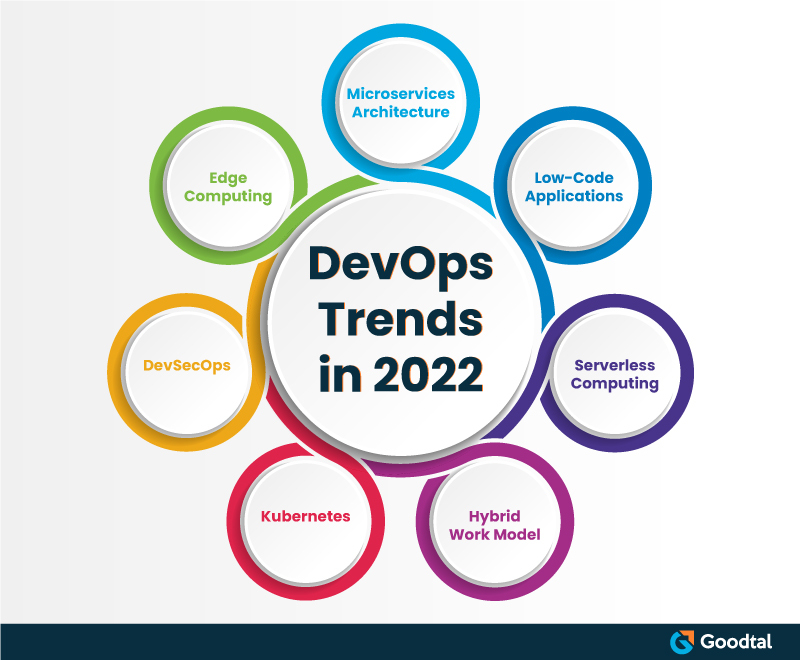
The name DevOps comes as a portmanteau of development and operations. It implies that DevOps focuses on cross-disciplined team members with developers and operations specialists working together to understand the problems from broader perspectives and develop effective solutions.
DevOps team generates ideas keeping in mind all the issues pertaining to development and operations and how one affects the other. Thus, the DevOps culture has persistently strived to bridge the gap between the development and operations, ensuring quality at all levels.
DevOps offers agility, time-efficiency, cost-effectiveness, and collaboration bundled for delivering superior quality. DevOps methodology reduces the workload of developers and teams through automation of repetitive tasks and process-driven, smart workflows.
More and more businesses are adopting the DevOps approach to deliver better solutions and meet customer expectations. However, with every new concept, technology, or approach, the trick is in how to get the best from it. So, to make sure that they leverage DevOps better than the competitors, businesses keep themselves updated about what’s trending in the DevOps development.
DevOps Trends to Embrace in 2022
Technology trends keep changing very rapidly. Here are the DevOps trends dominating the market in 2022.

Microservices Architecture
Microservices Architecture is a Service-Oriented architecture and approach that breaks down the application into smaller services that can be managed better as separate entities. And as you are aware, DevOps focuses on multidisciplinary teams that work together to bridge the gap between development and operations. So, you would perceive Microservices Architecture as something that goes against the concept of DevOps! However, the fact is that the collaborative approach of DevOps makes Microservices Architecture successful. Or, we can say, DevOps is an integral part of Microservices Architecture; combined, they facilitate high-quality software development and delivery.
While Microservices Architecture isolates issues of each service and reduces their impact on the application as a whole, the DevOps approach adds collaboration and effective communication between the services. We can conclude that the Microservices Architecture trend will empower the future of DevOps and increase the adoption of Devops manifold.
Low-Code Applications
For high-quality and effective development, transformation is the key to DevOps methodology. DevOps optimizes the processes and improves communication between teams and processes. When development and operations are interlinked, the aim is to eliminate repetitive, cumbersome, and time-consuming tasks and substitute them with faster processes. The best way to optimize development is to adopt low-code application development whenever possible. Low-code development facilitates minimal possible coding that frees the developer’s precious time and allows him to focus on other problem aspects. Thus, we can say that low-code development is a significant DevOps trend.
Various low-code development platforms are available for developers to choose from as per the requirements of their projects. The new generation of low-code platforms is also explicitly designed for DevOps. Thus, both DevOps and low-code development reinforce each other’s trends.
Serverless Computing
DevOps approach for Cloud environments is now shifting towards a serverless architecture concept. In serverless architecture, the allocation and provisioning of servers are managed dynamically and as needed. Thus serverless allows better scaling, flexibility, and quicker release.
Serverless architecture reduces complexity, decreases maintenance needs, lowers costs, and thus makes the system efficient and secure. Serverless Architecture frees DevOps teams from time-consuming tasks such as operating system updates and monitoring and shifts these responsibilities to the third-party Cloud service providers. Serverless architecture also reduces DevOps costs as applications can be run without having to manage infrastructure.
Hybrid Work Model
Hybrid work culture started pre-Covid-19 but has been accepted in a big way after the pandemic hit the world. Offering a mix of remote and on-premise work, the Hybrid work mode poses significant challenges for businesses. Yet, Hybrid work must continue owing to the tremendous benefits, and the way employees have responded to it. The DevOps approach helps make Hybrid work effective for software application development businesses.
Now that businesses are treating Hybrid work as a long-term transformation, communication and collaboration are the most important aspects they need to focus on. DevOps is also being adopted increasingly in the last two years as there is an increasing need for effective communication between the Hybrid, on-premise, or remote teams operating from anywhere and with time flexibility. DevOps facilitates a collaborative work model, and in these times when the Hybrid mode of working is more and more being accepted as a norm, Devops is the key to successful collaboration in the teams.
DevOps also focuses on increasing automation to avoid repetitive tasks and ensure real-time collaboration on tasks. Automation is the backbone of Hybrid work as so many people and teams have to be managed with real-time activity updates.
DevOps approach also increases speed in software and application development, thus enabling the teams to work from anywhere or in a Hybrid work model without affecting the work outcomes. The basic principles of DevOps are contributing to the widespread adoption of Hybrid work culture, particularly in software and application development businesses.
Kubernetes
As already mentioned above, for better quality and productivity, it is essential to incorporate automation in software and application development. Automation is crucial to DevOps as it makes the processes streamlined and efficient.
As we all know, the open-source container orchestration system, Kubernetes, automates software deployment, scaling, and management. It is also a DevOps trend as Kubernetes helps the transition of DevOps infrastructure to Azure or AWS cloud. Also, the inherent capabilities of Kubernetes facilitate building, deploying, and scaling enterprise-grade DevOps pipelines. Kubernetes deployment automation enables DevOps specialists to move applications, features, and software between the testing and production environments.
Kubernetes empowers DevOps by allowing businesses to construct Infrastructure as Code. Kubernetes can access tools and every part of the application, including ports, access controls, and databases. Similarly, environment configurations are also managed as code. Deployment of a new environment is easy as you dont have to run a script every time; you can simply allow Kubernetes access to a source repository that has configuration files.
DevSecOps
The combination of development and operations would still not be successful unless the process ensures the delivery of a secure application. DevSecOps is a development approach that combines development, operations, and security, while DevOps combines development and operations. So, DevSecOps can be viewed as an extension of DevOps. It is the most crucial DevOps trend.
DevSecOps is popular as it focuses on integrating security at all levels and making it a shared responsibility throughout the development cycle. With the DevSecOps approach, security testing and protection are implemented at the early stages of software or application development to reduce security problems later. DevSecOps handles the vulnerabilities at all levels so that the processes ensure safety and deliver quality outcomes. Threat modeling, vulnerability testing, and incident management are inherent to DevSecOps.
DevSecOps definitely increases complexity in large-scale or multi-cloud environments. In a way, it also results in an increase in costs of development, but it helps deliver robust applications without errors, risks, and vulnerabilities. Moreover, when implemented by experts, DevSecOps can deliver excellent results and high-quality outcomes despite the complexity.
This is the reason why the DevSecOps approach is gaining more and more popularity, and many businesses are finding it essential to adopt this approach. DevSecOps is thus a cultural shift in the way DevOps teams work; it encourages a culture of implementing security in the teams while they are managing development and operations.
Edge Computing
Edge computing has transformed the way large systems work. For example, large-scale IoT systems require the handling of huge volumes of data. Storing and processing such volumes of data is a task. In Edge Computing, applications run on edge devices. Edge Computing thus involves capturing, storing, processing, and analyzing data at the site of its generation instead of a centralized data-processing warehouse. Edge Computing is therefore increasingly being adopted in large-scale systems that require flexibility.
DevOps principles add better quality and management to Edge Computing systems. In fact, DevOps is almost integral to successful Edge Computing as it enables continuous integration, continuous delivery, continuous testing, and value stream management at the Edge. DevOps approach helps simplify the management of distributed and cumbersome Edges.
The collaboration and communication aspects of DevOps help scale and integrate various modules in Edge Computing as the need arises. The integration of DevOps with Edge Computing, or DevOps at the Edge, is termed as EdgeOps; it is the future of smart systems.
Summary!
DevOps is the present and future of software and application development. More and more businesses are adopting DevOps to perform better than their competitors. Therefore, DevOps will stay and transform into more innovative approaches to empower application development like never before.
However, to maximize the benefits of the DevOps approach, the top DevOps developers must keep a watch on the trending tools, technologies, and concepts that make DevOps more powerful and effective.
